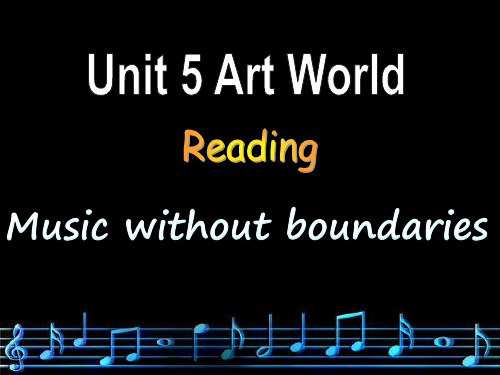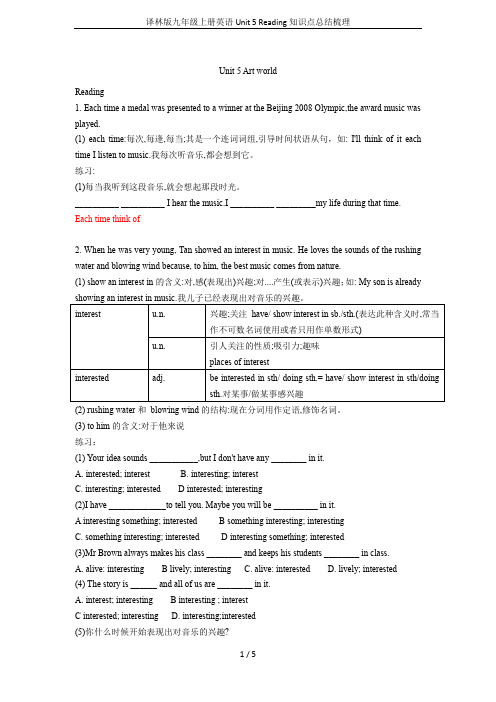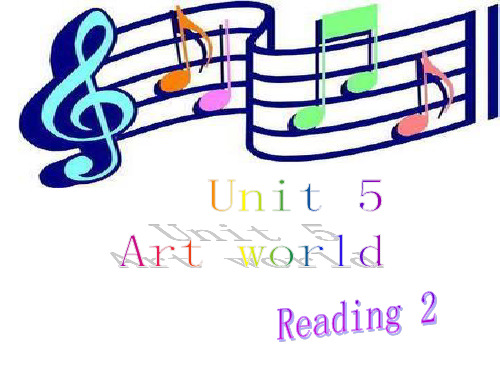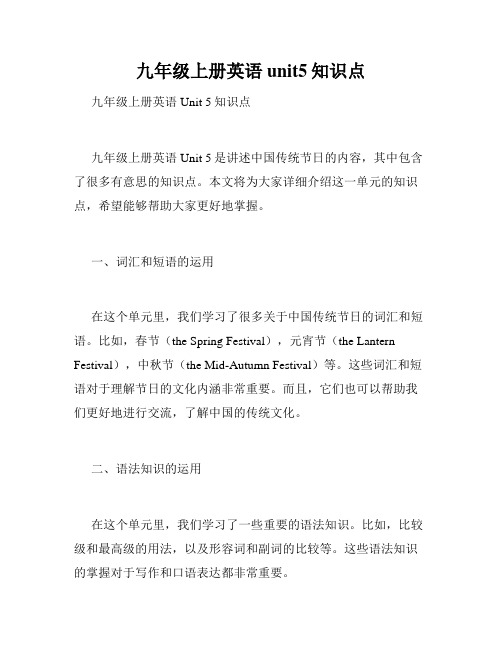九年级英语上册第五单元知识点讲解Reading
(牛津译林版)英语九年级上册 Unit 5 知识梳理

Unit 5 Art world知识梳理知识点一词组、短语归纳Comic strip & welcome to the unit1、art world 艺术世界2、have an art festival 举办艺术节3、the different art forms 不同的艺术形式4、a kind of 一种……5、pop music 流行音乐6、His musical talent was amazing.他的音乐天赋令人很惊讶。
Reading1、Music without boundaries 无国界音乐1.a world-famous composer一个举世闻名的作曲家2.show an interest in music展示了对音乐的兴趣show an/great interest in sth.对某事有兴趣show/take no interest in sth.对某事无兴趣3、the sounds of the rushing water 湍急的水声4、the blowing wind 徐徐微风5、come from nature 来自大自然6、make music with 用……制作音乐7、learn to do sth 学会做某事8、enter sp. = go into sp. 进入某地9、go on to do sth 继续做(另一件)某事go on doing sth 继续做(之前)某事10、get to know了解11、be known for …be famous for … 因……而著名12、a piece of music 一首音乐13、the speed of water flow 水流的速度14、create different pictures in different minds在不同的脑海里会产生不一样的画面15、build a bridge between the East and the West 在东西放之间搭建了一座桥梁16、bring sth together 把某物放在一起17、traditional Chinese music 传统的中国音乐18、in a Western style 用西方的风格19、In his works 在他的作品中21、modern Western music 现代西方音乐22、mix together 融合在一起23、make a new type of music 制作一种新的音乐24、A dividing line 一条分割线25、if necessary 如果有需要26、Each time a medal was presented to a winner, the award music was played.每次给获奖者发奖牌时,颁奖音乐就会响起。
九年级上册英语知识点Unit5

九年级上册英语知识点Unit5 Unit 5 of the ninth-grade English textbook covers various essential knowledge points, and it plays a crucial role in enhancing students' English proficiency. In this article, we will discuss the key concepts and skills covered in Unit 5.Vocabulary Skills:Vocabulary acquisition is a fundamental aspect of language learning. In Unit 5, students are introduced to words related to leisure activities, such as "hobby," "interest," "pastime," and "excursion." These terms enable students to express their preferences and discuss their leisure time effectively.Grammar:Grammar is the backbone of any language. Unit 5 focuses on the review and reinforcement of the present continuous tense, using it to describe future arrangements and activities. Understanding how to form and use this tense is essential for clear communication.Listening and Speaking:Unit 5 presents learners with various activities to improve their listening and speaking skills. Students listen to dialogues andconversations focusing on leisure activities, which helps them develop their ability to understand spoken English. Moreover, they engage in pair and group discussions, allowing them to practice expressing their opinions and ideas about hobbies and leisure activities confidently.Reading Comprehension:The reading texts in Unit 5 are carefully selected to provide students with a chance to practice their reading comprehension skills. They are exposed to different types of texts, including articles, advertisements, and short stories. These reading materials not only expand students' vocabulary but also enhance their understanding of sentence structures and overall reading comprehension.Writing:Unit 5 also emphasizes the importance of developing writing skills. Students are encouraged to write about their personal interests and hobbies, using the target language accurately and creatively. Through various writing tasks, students learn to express themselves effectively in writing, improving their overall language proficiency.Cultural Awareness:In addition to language skills, Unit 5 also aims to broaden students' horizons by introducing them to different cultures. Students have the opportunity to explore the leisure activities and traditions of people from various countries, promoting cultural exchange and fostering an appreciation for diversity.Critical Thinking:Unit 5 incorporates critical thinking skills, encouraging learners to analyze, evaluate, and interpret information. By engaging with the texts and tasks provided, students develop their ability to think critically, enabling them to make logical connections, draw conclusions, and express their opinions effectively.Self-Assessment and Reflection:Throughout Unit 5, students are given opportunities for self-assessment and reflection. They are encouraged to analyze their strengths and weaknesses in English learning, set realistic goals, and track their progress. This self-reflection helps students become more self-aware and responsible learners.In conclusion, Unit 5 of the ninth-grade English textbook covers a range of essential knowledge points and skills. From vocabulary acquisition to listening and speaking practice, from readingcomprehension to writing tasks, this unit offers a comprehensive learning experience. It not only focuses on language proficiency but also promotes cultural awareness, critical thinking, and self-assessment. Mastering the content in Unit 5 is crucial for students to enhance their English abilities and become effective communicators.。
最新牛津译林版初中英语九年级上册Unit5Reading课件

use traditional Chinese music and the sounds of an ancient Chinese bell in a western style
studying life
show an interest in(para.3)
make music with
when he was young (para.2)
the way to music
It’s you who shape your life and your future!
music without boundaries
How amazing Tan Dun’s music is.
Tan’s music--- Without musical instruments
doesn’t use any musical instruments. is made by over 50 sounds from water by controlling the speed of water flow.
Match the words with their meanings:
f d e
b c a
Complete the conversation below.
Daniel: Tan Dun is one of the greatest (1)__c_o_m__p_o_s_e_r_s_ in
the world. Could you tell me more about him?
Daniel: Wow! His music for the Beijing Olympics must be very special!
牛津上海英语九年级上册 Unit5 Reading (共19张PPT)

T /F
2 People have two kinds of memory.
T/F
3 Memory plays an important part in our lives.T / F
4 Making pictures in your mind helps you
remember things.
T/F
Why is “smiles” the longest word in the world? What kind of method does Pansy use to memorize the word?
Read Pansy’s article again and complete the following sentences with proper words.
their short-term memory becomes weaker
they still remember the things that happened a long time ago
short-term memory
when people get old, they start to lose memory
5 The Guinness Book of Records is about memory.
T/F
6 Memory and feelings are connected with
each other.
T/F
Skim the whole passage and match the main ideas of the short articles with the editors.
able to memorize more than 15,000 telephone numbers
九年级上册英语u5知识点归纳

九年级上册英语u5知识点归纳Unit 5 Knowledge Points SummaryAs we dive into the fifth unit of our ninth-grade English course, it's important to consolidate our understanding of the key knowledge points covered. This unit focuses on various themes, including sports, hobbies, and future plans. Let's delve into the details without further ado.Vocabulary and Phrases:To begin with, expanding our vocabulary is crucial for effective communication. In Unit 5, we come across numerous words and phrases related to sports and hobbies. For example, terms such as "soccer," "basketball," "tennis," and "swimming" are common sports activities. Hobbies, on the other hand, could include "reading," "painting," "playing musical instruments," and "collecting stamps." Moreover, it's important to know how to use phrases to express preferences, such as "I prefer," "I'd rather," and "I'm fond of."Grammar:Next, understanding the grammar concepts in this unit is essential for constructing meaningful sentences. Unit 5 introduces the usage of gerunds and infinitives. Gerunds function as nouns and are formed byadding "ing" to a verb, like "swimming." Infinitives, on the other hand, are the base form of a verb, like "to play" or "to read." Learning when to use gerunds and infinitives is crucial to improve sentence structure and comprehension.Listening and Speaking:Developing listening and speaking skills is paramount for effective communication. In this unit, we are exposed to various listening exercises that require us to comprehend dialogues related to sports and hobbies. By carefully listening, we can enhance our ability to understand spoken English and improve our pronunciation. Additionally, participating in speaking activities allows us to express our ideas and opinions confidently. Engaging in role-plays or debates related to sports and hobbies can polish our speaking skills and broaden our communication abilities.Reading and Comprehension:The ability to read and comprehend passages is crucial for understanding more complex texts. Unit 5 presents articles and texts centered around sports and hobbies. By practicing reading strategies such as skimming and scanning, we can extract essential information effectively. Comprehension exercises that follow the reading passagesallow us to gauge our understanding and improve our reading comprehension skills.Writing:Lastly, honing our writing skills is an integral part of language mastery. In this unit, we explore various writing tasks, such as describing our favorite hobby, writing an email inviting a friend to play a sport, or simply expressing our future plans. By practicing coherent paragraph structures, using appropriate vocabulary, and maintaining correct grammar, we can enhance our writing abilities.In conclusion, Unit 5 encompasses a comprehensive range of knowledge points. Mastering the vocabulary and phrases related to sports and hobbies is critical for effective communication. Understanding gerunds and infinitives enhance our sentence construction skills. Developing listening, speaking, reading, and writing abilities will contribute to overall language proficiency. Let's continue to consolidate these knowledge points to excel in our English learning journey.。
译林版九年级上册英语Unit 5 Reading知识点总结梳理

Unit 5 Art worldReading1.Each time a medal was presented to a winner at the Beijing 2008 Olympic,the award music was played.(1) each time:每次,每逢,每当;其是一个连词词组,引导时间状语从句,如: I'll think of it each time I listen to music.我每次听音乐,都会想到它。
练习:(1)每当我听到这段音乐,就会想起那段时光。
__________ __________ I hear the music.I __________ _________my life during that time. Each time think of2. When he was very young, Tan showed an interest in music. He loves the sounds of the rushing water and blowing wind because, to him, the best music comes from nature.(1) show an interest in的含义:对,感(表现出)兴趣;对....产生(或表示)兴趣;如: My son is already(2) rushing water和blowing wind的结构:现在分词用作定语,修饰名词。
(3) to him的含义:对于他来说练习:(1) Your idea sounds ___________,but I don't have any ________ in it.A. interested; interestB. interesting; interestC. interesting; interested D interested; interesting(2)I have _____________to tell you. Maybe you will be __________ in it.A interesting something; interestedB something interesting; interestingC. something interesting; interested D interesting something; interested(3)Mr Brown always makes his class ________ and keeps his students ________ in class.A. alive: interesting B lively; interesting C. alive: interested D. lively; interested(4) The story is ______ and all of us are ________ in it.A. interest; interesting B interesting ; interestC interested; interesting D. interesting;interested(5)你什么时候开始表现出对音乐的兴趣?When did you __________________________________________________music?BCDD show an interest in3. Since he had no musical instruments then, he made music with common objects like stones and paper. Eight years later, he went on to study in the USA. There he got to know great musicians from around the world.练习:(1) Mark needs to learn Chinese ___________ his company is opening a branch in Beijing.A unlessB until C. although D. since(2)I have heard a lot of good things about you __________ I came back from abroad.A. since B until C before D.when(3) After finishing his homework he went on __________ a letter to his parents.A. write B writing C wrote D. to write(4)We __________ each other since 2010.A have got to knowB got to knowC knewD have knownDADD1.Instead, Tan makes over 50 sounds from water by controlling the speed of water flow.(1)instead的用法:【注意】区分instead和instead of:①instead副词,单独使用。
牛津译林英语九年级上册U5知识点归纳

牛津译林英语九年级上册U5知识点归纳Unit 5: HeroesIn the ninth grade English textbook from Oxford Yilin, Unit 5 explores the theme of heroes. This unit provides various knowledge points, including vocabulary, grammar, reading, and writing skills. Through studying this unit, students can not only deepen their understanding of English, but also gain insights into different heroes and their characteristics. Let's delve into the main learning points of Unit 5.Vocabulary:1. Heroic adjectives: This section introduces words such as brave, courageous, fearless, and selfless. It teaches students how to use these words to describe heroic characteristics. For example, we can say someone is brave when they face danger without fear.2. Heroic nouns: Students learn a range of nouns related to heroes, such as role model, inspiration, and legend. These words help students to express their admiration for someone and explain why they see them as a hero.Grammar:1. Passive voice: Unit 5 emphasizes the use of passive voice constructions. Students learn how to change active sentences into passive ones and recognize when it is appropriate to use the passive voice. Passive constructions are often used when the focus is on the receiver of an action rather than the doer.2. Past participle: Alongside passive voice, the study of past participle plays a significant role in Unit 5. Students learn to identify the past participle form of verbs and use them correctly in passive voice constructions.Reading:1. Biographies: Unit 5 features biographical texts about different heroes from various fields, such as sports, politics, and science. Students not only learn about the lives and achievements of these heroes, but also practice reading comprehension skills, such as identifying main ideas and supporting details.2. Timescales: The unit introduces vocabulary related to different periods of time, such as ancient, medieval, and contemporary. This vocabulary helps students understand the context in which heroes lived and the impact they had on their respective eras.Writing:1. Hero profiles: Students are encouraged to write profiles of their chosen heroes. They need to include background information, achievements, and reasons why they consider their chosen hero to be significant. This exercise enhances their writing skills and critical thinking abilities.2. Compare and contrast: Unit 5 provides opportunities for students to compare and contrast different heroes based on their characteristics, achievements, and contributions. This activity helps them develop analytical skills and learn how to organize their ideas in a logical manner.In conclusion, Unit 5 of the Oxford Yilin ninth grade English textbook explores the theme of heroes and encompasses various knowledge points. Vocabulary, grammar, reading, and writing skills are all covered in this unit. By examining heroic adjectives and nouns,practicing passive voice and past participle, reading biographies, and writing hero profiles, students can enhance their English language proficiency and expand their knowledge of heroes from different fields. Unit 5 not only enables students to learn English effectively, but also cultivates their critical thinking and analytical abilities.。
九年级英语上册Unit5reading(2) (共21张PPT)

• 二、根据中文提示,填入正确的单词。 • 1. 在梅西小时候,他对足球表现出很大的兴趣。 • When Messi was very young, showed ______ an interest in he ______ _____ ______football. • 2. 谭盾成功地把中国音乐和西方音乐结合到一起。 • Tan Dun has_______ brought Chinese and ______ music together. successfully western • 3. 我的理想是拥有一份自由的工作。 • My dream is _____ ______ a free job.
6. though it is in a Western style. though是连词,意思是虽然,尽管,常用 于引导让步状语从句,但不能和but连用,两 者只能用一个。例如: 虽然他很小,但是他可以照顾自己了 Though he is young , he can look after himself. He is young , but he can look after himself.
to
own
Exercises
4. 长城因为它的雄伟和美丽而闻名。 famous ________ for The Great Wall is ________ its greatness and beauty.
5. 虽然他那时没有乐器,但他用像石头和 纸这样的普通物体创作音乐。 Though he had no ______ music instruments _______ _____ then, he made music like with________ ________ common ________ objects stones and papers.
牛津译林版九年级上册第五单元知识点讲解(教师版)

牛津译林版9AUnit5 Art world知识点讲解(教师版)教学目标:情景式教学,引用四位名人(梵高,谭盾,莫奈,贝多芬)的故事带动学生掌握U5重难点。
Wele to the unitStory1:Vincent van Gogh (梵高)What art forms do you like?I like art best.My favorite artist is Vincent van Gogh,a famous artist who was born in Netherland(荷兰)and has many famous works,including the sunflower and the selfie.He was so crazy about art that he cut one ear him,art is somethingpleasantand relaxing,he never stopped drawing through his life.His art talent was so amazing that he could drawfor 12 lions ofpeople went to Musée d'Orsay to admire his works each year.1.Art is something pleasant and relaxing1.something 为不定代词,修饰形容词时应放在形容词的前面。
(不定代词美名扬,形容词后面藏。
)你还知道哪些不定代词呢?任何重要的事情某个骄傲的人pleasant1.(22·23下·徐州·二模)—How’s the new restaurant?—It’s ________. We waited a long time for the dishes to arrive.A.awful B.fantastic C.perfect D.pleasant 2.(22·23·江苏·专题练习)All of us feel pleased with the ________ trip.A.pleasing B.pleasure C.pleased D.pleasant 3.(21·22上·扬州·期中)This is a ________ film. Cindy is ________ with it.A.pleased, pleasant B.pleasant, pleasedC.pleased, please D.pleasant, please4.(20·21下·苏州·二模)—How was your recent trip to Suzhou?—Well, I’ve never had ________ one before!A.a pleasant B.a more pleasant C.a most pleasant D.the most pleasant 5.(20·21上·南京·阶段练习)Amy is a ________ nurse. Each of her patients is ________ with her kindness and service.A.pleasant; pleasant B.pleased; pleasantC.pleased; pleased D.pleasant; pleased【答案】ADBBD2.What art form do you like?form 作可数名词,含义为形式,类型固定短语:in the form of 以.....形式 art form 艺术形式例:Mum made many cookies in the form of animals for me.妈妈做了很多动物式样的饼干。
牛津上海英语九年级上册 Unit5reading(共20张PPT)

Healthy food and plenty o1f v.itaHmainvs earehesesaenlttiahl fyor yfoourod
memory to work properly. Drinking a lot of water also helps
P4 maintain your memory. Yo2u m.Husat avlloew ypoluer nbrtaiyn toohfavevitamins
ypoeuoprle believe they may cause problems with memory.
health
5.Be relaxed
In order to concentrate well, you must be relaxed. Generally
P5 keeping fit and having regula6r h.eKalethecphecfksitare both
also be useful tools.
6
It is important that you regularly stimulate your brain to make
your memory more efficient.
1).Do activities that
Fchoar negxeamdapilley,hyaobuitcsa. nL1e.daSorntaiicnmtgivuailtiaentseewthyasktoiyluloy2rhuo)e.udlCpodshnaoyonontguoeurtsbyuuroaasuliulnryadlddleyoavialdeynloodhp
While reading P2-3
译林版九年级英语上册Unit 5 Reading (II) 示范公开课教学课件

1. Polish your article about Zhang Yimou.2. Preview Grammar.
Homework
Homework
Crouching Tiger, Hidden Dragon.
Who wrote it?
Tan Dun.
Review and introduce
Revision
Read Tan Dun’s profile and use your own words to introduce him.
Read Para. 1 and answer
What is Tan Dun best known for?
be known for 因……而出名
= be famous for
be known as= be famous as 作为……而出名
is known as
Choose and fill
Presentation
Revision
Yu Hua (1) ___________ a writer, and he (2) ____________ the novel To Live.
Tan makes over 50 sounds from water by (1) __________ the speed of water flow instead of using musical (2) ____________.
controlling
instruments
Tan Dun likes the sounds of nature, and he uses them a lot in his music.
初三英语上册第五单元知识点讲解Reading

初三英语上册第五单元知识点讲解ReadingArt worldReading重点单词1 present n.颁发;提交present意为“颁发;提交”时是一个及物动词,常用于结构present sb. With sth.(给某人颁发某物)或present sth. to sb. (把某物颁发/提交给某人)。
e.g. The organization present him with an award. = The organizati on present an award to him. 那个组织给他颁发了一个奖项。
The students will present their plans lo their teacher next wee k.学生们将于下周向老师提交打算。
拓展(1) present还可作名词,意为“现在,目前;礼物”。
当它表示“现在,日前”时,常构成短语at presenL,意为“现在,目前”,相当于now。
e.g. I can't help you at present, because I’m too busy.我现在帮不了你,因为我实在太忙了。
I gave him a special present yesterday.昨天我给了他一份专门的礼物。
(2)present还可作形容词,表示“现在的,且前的”时,present只能用于名词前;表示“出席的,到场的”时,present不用于名词前,其反义词为absen t(缺席的),be present at sth.意为“出席..... ,其反义短语为be absent from sth.意为“缺席...e.g. Here is my present address.这是我现在的地址。
Many people were present at the meeting. 许多人出席了这次会议。
2 central adj. 中心的, 中央的central作形容词意为“中心的,中央的”时,仅用于名词前,且没有比较级形式。
九年级英语上册第五单元重要知识点总结

九年级英语上册第五单元重要知识点总结本文旨在总结九年级英语上册第五单元的重要知识点,便于同学们进行回顾和巩固。
以下是该单元的重点内容:一、过去进行时(Past Continuous Tense)过去进行时表示过去某个时间点或某段时间内正在进行的动作。
构成:was/were + 动词-ing。
例句:I was studying when my friend came over.(当我朋友来的时候,我正在学习。
)二、过去进行时的用法1. 过去进行时描述过去某个时间点或事情发展的背景。
例句:When she called me, I was cooking dinner.(她给我打电话时,我正在做晚饭。
)2. 过去进行时用于表示过去某个时间内正在进行的动作,常与表示具体时间段的时间状语连用。
例句:Yesterday at this time, we were playing basketball.(昨天这个时候,我们正在打篮球。
)三、过去进行时的标志词while, when, as等用于引导主句和从句之间的时间关系。
例句:I was studying while my sister was watching TV.(当我姐姐在看电视时,我正在学习。
)四、过去进行时与一般过去时的对比过去进行时强调某个时刻或时间段内正在进行的动作,而一般过去时侧重于描述已经完成的动作或状态。
例句:I was reading a book when the phone rang.(电话响了,而我正在看书。
)五、描述人物特征与身体状况1. 形容词用于描述人或物的特征,一般放在名词前。
例句:a tall man(一个高个子男人)2. 形容词性物主代词用于表示所有关系。
例句:His book is on the desk.(他的书在桌子上。
)3. 形容词用于描述人的身体状况,一般放在be动词之后。
例句:She is tired after running.(她跑步后很累。
九年级上册英语unit5知识点

九年级上册英语unit5知识点九年级上册英语Unit 5知识点九年级上册英语Unit 5是讲述中国传统节日的内容,其中包含了很多有意思的知识点。
本文将为大家详细介绍这一单元的知识点,希望能够帮助大家更好地掌握。
一、词汇和短语的运用在这个单元里,我们学习了很多关于中国传统节日的词汇和短语。
比如,春节(the Spring Festival),元宵节(the Lantern Festival),中秋节(the Mid-Autumn Festival)等。
这些词汇和短语对于理解节日的文化内涵非常重要。
而且,它们也可以帮助我们更好地进行交流,了解中国的传统文化。
二、语法知识的运用在这个单元里,我们学习了一些重要的语法知识。
比如,比较级和最高级的用法,以及形容词和副词的比较等。
这些语法知识的掌握对于写作和口语表达都非常重要。
三、阅读理解和听力技巧这个单元里的阅读理解和听力部分是帮助我们提高对英语的理解和运用能力的重要途径。
通过阅读和听力练习,我们可以更好地理解文章的主旨和细节,提高对语言的理解能力。
四、文化差异的认识本单元以中国传统节日为主题,所以我们在学习的过程中也会涉及到一些中西方文化的差异。
比如,在中国,过年是最重要的节日,家人会团聚在一起,共度美好时光。
而在西方,圣诞节是最重要的节日,人们会交换礼物,庆祝新年的到来。
通过了解这些文化差异,我们可以更好地与其他国家的人进行交流和交往。
五、作文写作和口头表达的能力培养在九年级上册英语的Unit 5中,我们会进行一些作文写作和口头表达方面的练习。
通过这些练习,我们可以提高自己的写作和口头表达能力,增强自信心。
六、课外扩展和联想除了教科书上的内容,我们还可以通过课外的扩展阅读来进一步了解有关中国传统节日的知识。
可以看一些与传统节日相关的书籍、文章,或者观看相关的纪录片,在网上搜索一些有关中国传统节日的资料,增加我们对中国传统文化的了解。
在学习这一单元的过程中,我们不仅仅是学习了知识点,更多地是培养了我们的综合运用能力。
九年级上第五单元英语知识点讲解

九年级上第五单元英语知识点讲解在九年级上册英语课程中,第五单元是一个非常重要的单元,涉及到了一些基本的语法规则和词汇用法。
本篇文章将对这些英语知识点进行详细的讲解,希望能够为大家的学习提供一些帮助。
1. 时态的使用时态是英语中一个非常重要的语法概念,它表示动作发生的时间。
在第五单元中,学生将学习到一些常用的时态,包括一般现在时、现在进行时以及一般过去时。
一般现在时用于表示经常发生的动作或普遍真理。
例如:I goto school every day.(我每天去上学。
)The sun rises in the east.(太阳从东方升起。
)现在进行时用于表示现在正在进行的动作。
例如:He is watching TV now.(他正在看电视。
)I am studying for the test.(我正在为考试复习。
)一般过去时用于表示过去发生的动作。
例如:He went to the park yesterday.(他昨天去了公园。
)We lived in that house for ten years.(我们在那座房子里住了十年。
)2. 形容词和副词的比较级和最高级在第五单元中,学生将进一步学习形容词和副词的比较级和最高级的用法。
比较级用于比较两个人或物的特征,最高级用于比较三个或三个以上人或物的特征。
形容词的比较级和最高级的构成方式有一些规则。
大多数形容词的比较级在词尾加-er,最高级在词尾加-est。
例如:tall(高)- taller(更高)- tallest(最高)。
有些形容词有规则变化,例如:big(大)- bigger(更大)- biggest(最大);good(好)- better(更好)- best(最好)。
部分形容词和副词的比较级和最高级是不规则的,例如:good (好)- better(更好)- best(最好);far(远)- farther/further (更远)- farthest/furthest(最远)。
Unit5知识清单(预习复习知识点详解)-2021-2022学年牛津译林版九年级英语上册

9A Unit 5 Art World 知识清单一、ic strip and Wele to the unit.1.something pleasant 令人愉快的东西【形容词放在不定代词后】注:pleasant 令人愉快的(常修物);pleased 高兴的,愉快的(常修人)2.find something more pleasant than art 发现比艺术更让人愉快的事情3.have an art festival 举办一个艺术节4.the King of Pop 流行音乐之王5.musical talent 音乐天赋①music(不可数n.)→ musical(adj.) →musician(n.)音乐家② talent通常是不可数名词:表天赋、才能;talent也可作可数名词:表示“才艺”的时候,有多种多样的才艺。
【拓展】a talented musician 一个天才音乐家【talented形容词:天才的,有天赋的】二、Reading1.music without boundaries音乐无国界/音乐无边界2.Each time a medal was presented to a winner at Beijing Olympic Games,the award musicwas played. 在北京奥运动上,每次一枚奖牌被颁发给一个获胜者时,颁奖音乐被播放。
★①present sth. to sb. = present sb. with sth. (主动)颁发某物给某人,把某物赠送给某人,将某物呈献给某人→ sth. be presented to sb. 某物被颁发给某人(被动)★②the award music 颁奖音乐3.a worldfamous poser 一位世界著名的音乐家= a famous/known poser around the world = a famous/known poser all over the world4.in central Hunan 在湖南中部= in the centre of Hunan5.show an interest in music 对音乐感兴趣= be/bee interested in music6.the sounds of the rushing water and the blowing wind 流水和风吹的声音7.musical instruments 乐器8.make music with mon objects like stones and paper 用像石头和纸样的普通物体创作音乐9.go on to study in the USA 继续到美国学习【回顾】①go on to do sth. 继续做不同的事= continue to do sth.② go on doing sth./go on with sth. 继续做相同的事= continue doing sth.10.get to know great musicians from around the world 逐渐/开始认识了来自世界各地的音乐家11.as a poser 作为一名作曲家12.He is best known for winning an Oscar for his music in the film.他最为出名的是他在电影中的音乐赢得奥斯卡奖★①be known for... = be famous for... = be wellknown for... 因......而著名★②be known as... = be famous as... = be wellknown as... 作为......(身份)而著名★③be known/wellknown to... 为......(人)所熟知Eg: Mountain Mao is known to the people all over China. 茅山为全中国人所熟知。
- 1、下载文档前请自行甄别文档内容的完整性,平台不提供额外的编辑、内容补充、找答案等附加服务。
- 2、"仅部分预览"的文档,不可在线预览部分如存在完整性等问题,可反馈申请退款(可完整预览的文档不适用该条件!)。
- 3、如文档侵犯您的权益,请联系客服反馈,我们会尽快为您处理(人工客服工作时间:9:00-18:30)。
九年级英语上册第五单元知识点讲解Art worldReading重点单词1 present n.颁发;提交present意为“颁发;提交”时是一个及物动词,常用于结构present sb. With sth.(给某人颁发某物)或present sth. to sb. (把某物颁发/提交给某人)。
e.g.The organization present him with an award. = The organization present an award to him. 那个组织给他颁发了一个奖项。
The students will present their plans lo their teacher next week.学生们将于下周向老师提交计划。
拓展(1) present还可作名词,意为“现在,目前;礼物”。
当它表示“现在,日前”时,常构成短语at presenL,意为“现在,目前”,相当于now。
e.g. I can't help you at present, because I’m too busy.我现在帮不了你,因为我实在太忙了。
I gave him a special present yesterday.昨天我给了他一份特别的礼物。
(2)present还可作形容词,表示“现在的,且前的”时,present只能用于名词前;表示“出席的,到场的”时,present不用于名词前,其反义词为absent(缺席的),be present at sth.意为“出席..... ,其反义短语为be absent from sth.意为“缺席...e.g. Here is my present address.这是我现在的地址。
Many people were present at the meeting. 许多人出席了这次会议。
2 central adj. 中心的, 中央的central作形容词意为“中心的,中央的”时,仅用于名词前,且没有比较级形式。
e.g. He lives in central London.他住在伦敦市中心。
拓展central作形容词时还可表示‘最重要的;主要的”,它常用于play a central role in sth.结构,表示“...中扮演重要角色”。
e.g. Prevention also plays a central role in traditional medicine. 预防在传统医学中也起着重要作用。
3 common adj.普通的,一般的,常见的common作形容词意为“普通的"时,仅用于名词前,且没有比较级形式;意为“一般的,常见的”时,其反义词为rare(稀有的,不常发生的) ,此时common常用于it's common for sb. to do sth.结构,表示“对某人来说做某事很常见”,注意it's common 后不接that从句。
e.g. Shakespeare's work was popular among the common people in his day.莎士比亚的作品在他那个年代很受平民百姓的欢迎。
Jackson is a common English name.杰克逊是一个常见的英文名。
It's common for children to be afraid of the dark.对儿童而言怕黑是很常见的。
4 control vt,控制,支配e.g. Control your temper. Don't get angry easily. 控制你的脾气,不要轻易发火。
拓展control 还可作名词,意为“控制权;支配权;控制能力”,其构成的常用短语有: take control of/over sth.控制某物full/ total control 完全控制get/go out of control失去控制be under control 被控制,受控制5 traditional adj; 传统的e.g. This is a traditional method of cooking turkey. 这是一种传统的烹饪火鸡的方法。
拓展tradition 为可数名词,意为“传统”;traditionally为副词,意为“传统地”。
e.g. There are lots of traditions at Spring Festival in China,中国的春节期间有许多传统。
The festival is traditionally held in May.这个节日按照传统是在五月份过的。
重点短语1 show an interest in sth.对某事物表现出兴趣e.g. When did you first show an interest in tennis?你是什么时候开始对网球表现出兴趣的?2 get to know sb.逐渐了解某人e.g. I'll take a while for you to get to know everyone. 你需要一段时间才能逐渐了解每-一个人。
3 be known for因..... 而著名e.g. The region is known/famous for its fine wines. 这个地区因它优质的葡萄酒而著名。
4 between…and...在.......和……之间e.g. I sat down between Susan and Tom.我在苏珊和汤姆之间坐了下来。
5 dividing line分界线;界限e.g. There is no clear dividing line between what is good and what is bad.是非之间没有明显的界限。
6 used to do sth.过去常常做某事e.g. He used to play football after work.他过去下班后常常踢足球。
要点详解1 When he was very young, Tan showed an interest in music.当他非常小的时候,谭盾就对音乐表现出了兴趣。
解析interest 在此作可数名词,意为“兴趣”,show an interest in sth.意为‘对某事物表现出兴趣”。
它还可构成have an interest in sth. (对某事物有兴趣),take an interest in sth. (对某事物产生兴趣) ,have no interest in sth. (对某事物没有兴趣) ,lose interest in sth. (对某事物失去兴趣)等结构。
e.g. Tom showed an interest in basketball.汤姆对篮球表现出了兴趣。
I'd recommend this book to anyone who has an interest in music. 我会向对音乐有兴趣的人推荐这本书。
I took an interest had no interest/lost interest in the film.我对这部电影产生了/没有/失去了兴趣。
拓展interest 也可作动词,表示“使感兴趣;使关注”。
e.g. What interests me is the history of these places.使我感兴趣的是这些地方的历史。
2 He loves the sounds of the rushing water and the blowing wind because, to him,the best music comes from nature.他喜欢淙淙的水声和飒飒的风声,因为对他来说,最美妙的音乐来自于大自然。
解析the rushing water意为“淙淙的流水”,the blowing wind意为'飒飒的风,这两个名词短语中都含有现在分词,它们在句中具有形容词的性质,均用作定语修饰名词,表示正在进行的主动动作。
e.g. I walked quietly in order not to wake my seeping father.我悄悄地走是为了不吵醒我那正在睡觉的爸爸。
注意:单个的现在分词作定语时往往放在被修饰词的前面;现在分词短语作定语时往往放在被修饰词的后面,此时其作用相当于定语从句。
e.g. The room was full of people waiting for the headmaster. =The room was full of people who werewaiting for the headmaster.房间里挤满了等侯校长的人。
3 There he got to know great musicians from around the world.在那里他逐渐了解了来自世界各地的伟大音乐家。
解析get to know sb/sth.意为“逐渐了解某人/某事”,强调一个逐渐变化或发展的过程。
e.g. We got to know each other from then on.从那以后我们逐渐了解彼此了。
After a long time, I got to know the culture of the company.过了一段时间,我逐渐了解了这家公司的文化。
拓展(1)get to do sth.结构还可表示“有机会做某事”,是一种非正式的表达方式。
e.g. I got to meet all the stars after the show.演出之后我有机会见到了所有的明星。
(2) get sb. /sth. to do sth.意为“让某人/某物做某事”。
e.g. He got his sister to help him with his homework.他让他姐姐帮他做作业。
4 As a composer, perhaps he is best known for winning an Oscar for his music in the film Crouching Tiger ,Hidden Dragon作为一位作曲家,也许他最为人知的是为电影《卧虎藏龙》作曲而赢得奥斯卡大奖。
解析be known for意为“因...而著名”,相当于be famous for其后常接表示人或事物某方面的特点、特长、价值等内容的名词,说明著名的原因。
